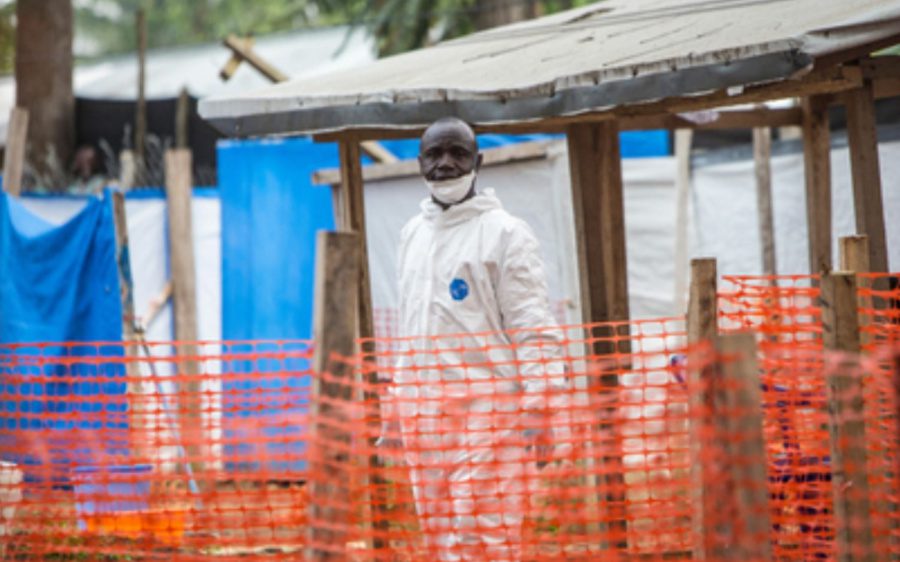
COVID-19 has made conditions in the already fragile state of the Democratic Republic of Congo even more difficult for older people where daily hardship is exacerbated by the need to protect themselves from exposure to the coronavirus.
A lack of ventilators, flooding, malaria, and forced expulsions from Angola which are leaving people homeless are all exposing older people to risk at a time when the virus is starting to spread in the country.
Lack of ventilators
To date, there are 1024 confirmed cases of COVID-19 in the DRC, all but 54 in the capital, Kinshasa. Officially, 41 people have so far died, 16 of them older people. Anatole Bandu, HelpAge DRC’s country director knows many of the older people who have died, as they contacted him before they contracted COVID-19 seeking help to access medicines they needed to treat their chronic diseases. Some were in a very weakened state as they had been unable to access the drugs needed to treat high blood pressure or diabetes, for example, because of the COVID-19 lockdown. All of the older people he knew died in hospital, unable to breathe, and did not have access to a ventilator. Some of them died in hospitals that had no access to ventilators; others died in hospitals that had ventilators, but they were being used by other patients.
It’s heartbreaking for everyone at HelpAge DRC, to lose our friends, but all the more so, as their deaths could have been preventable. It is vital that hospitals have ventilators for everyone who needs them. All of those who died are human beings who contribute to society and they don’t deserve to be left to die. It is also vital that older people receive extra support during COVID-19 as so many of them are risking their lives going out to work, as they have to work to eat, even though they are the most affected and at-risk group. Older people have contributed so much to the economy and to their families and they deserve to have a pension like their older counterparts in so many other countries.
Floods in Uvira, South Kivu Older causing malaria and hunger
Major flooding in Uvira in South Kivu in the east of DRC has left thousands of older people living in the open air, with no food, shelter, mosquito nets, and clean water; vulnerable to malnutrition, malaria, diarrhea, and possibly even cholera. Several cases of malaria have already been identified. More than 70,000 people were forced to flee after 15,000 homes were submerged when three rivers and Lake Tanganyika burst their banks following bouts of heavy rain that started in April and continued into early May.
COVID-19 has already been identified in South Kivu and with many of those left homeless aged over 60, the situation is even more precarious for them. They are being forced to live in the open air in crowded conditions with no sanitation or prospect of physical distancing.
Remy Ngabo, President of the Great Lakes Aging Network, a HelpAge partner said:
“The older people are very weak after having to flee for their lives and are very vulnerable to hunger and disease. Some aid agencies have intervened but this has not yet reached any of the older people.”
“On top of all this, there is the added fear of COVID-19. Physical distancing went out of the window when they were forced to flee together and many of them are now living in crowded conditions in classrooms and other public buildings and they have no soap and clean water or access to toilets.”
Angola expulsions
Hundreds of older people are currently stranded near the Congolese/Angolan border after being brutally expelled by the Angolan authorities. They have no access to medication to treat their injuries or chronic diseases and no food, shelter, or clean water.
Angola has expelled more than 700 Congolese people since the start of the Coronavirus crisis. They started arriving in the DRC on April 27th and are still coming over the border. According to the Kasai authorities, the deportees are Congolese people without legal status in DRC. Many fled DRC as a result of the conflict in Kasai, some had gone to work in the diamond mines and some were prisoners.
Delphin Mukumbila Djola, HelpAge DRC’s representative in the Kasai region met them in Kamako and was shocked by the condition he found them in:
“It was obvious that they had been forcibly removed. Many of them have very serious injuries as a result of being manhandled by the Angolan authorities and thrown into the backs of vehicles. They were forced into extremely overcrowded vehicles, which is highly concerning in the light of the Coronavirus pandemic.”
“They were thrown out of the country with nothing but the clothes on their backs and now they are very scared and vulnerable; trapped in a no man’s land. They can’t go back to Angola and they can’t go back to their homes in DRC as they don’t have a penny to their name. Many of them desperately need medication and may become seriously ill and even die if they do not receive it soon.”
To date, there are 36 official cases of COVID-19 in Angola and there have been two deaths, although it is believed by aid agencies that this figure is far higher. HelpAge is very concerned for the older people who are stranded, with no medication to treat their diseases, such as TB, diabetes, and high blood pressure. HelpAge DRC has provided older people with cash to buy medicines and hygiene items, such as soap and clean water, but is appealing for funds to be able to offer more comprehensive assistance.
The organization is calling on the DRC authorities to assist the displaced people with transportation and medication, as well as food and shelter for those not able to return home. for greater security at the border, which at the moment is very dangerous, especially for older people, women, and girls.
